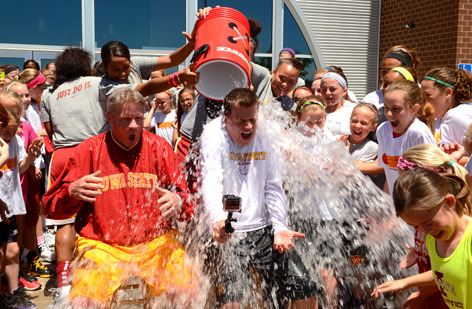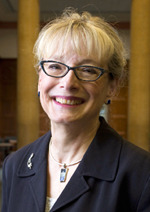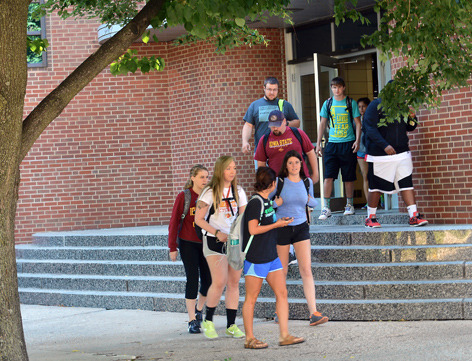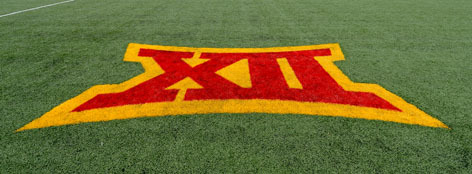Chillin' for cancer

Cyclone women's basketball players (l-r) Brynn Williamson, Maddie Baier (hidden) and Kidd Blaskowsky douse assistant coach Billy Fennelly with ice water June 20 as part of the national "#Chillin4Charity Challenge" to raise funds and awareness for the cancer fund that honors former North Carolina State women's coach Kay Yow. Seconds earlier, head coach Bill Fennelly (left) also got soaked during a break from basketball camp at the Sukup Basketball Complex. Photo by Bob Elbert.
TIER forum: 17 cases selected for detailed look
Consultants working on the state Board of Regents' efficiency study believe it's possible that the three state universities annually could save:
- $16 million to $40 million by collaborating on more vending contracts
- $11 million to $27 million by changing IT service models, reducing the number of applications and using less-expensive hardware, like thin client machines
- $1 million to $1.5 million by undertaking more energy-saving initiatives
Video
View the 110-minute forum video.
These were among efficiency ideas presented during a June 24 public forum, which drew approximately 100 members of the university community to Howe Hall and 74 viewers to the livestream webcast.
The forum marked the juncture between the first and second phases of the regents' Transparent, Inclusive Efficiency Review (TIER) of the three state universities.
Numerous preliminary proposals for reducing costs, increasing revenue and improving service were developed over the 10-week first phase as consultants collected large amounts of data and conducted nearly 400 interview sessions at the three universities.
Selected opportunities to be scrutinized
The regents and their consulting firm, Deloitte Consulting, narrowed those proposals to 17 that appear to offer the greatest efficiencies and cost savings. Deloitte labels the opportunities as "business cases," a reference to the detailed costs-benefits analyses that will be applied to them during the just-begun phase 2 of the review.
Deloitte project manager Virginia Fraser pointed out that the scrutiny applied to the business cases during the coming weeks likely will bring some changes to the opportunities list. Some savings estimates may go up while others fall. Some opportunities may be dropped or revised.
"This is the normal course of a project like this and it's part of a healthy process," Fraser said.
Business cases
Business cases will be built around these proposals during coming weeks:
Sourcing and procurement
- Negotiate more favorable contracts for targeted spending categories. Example: The three state universities might combine medical waste, biological waste, chemical waste and solid waste into a larger category called waste management and negotiate volume discounts.
Finance
- Simplify how finance processes are performed and streamline them. Example: Instead of involving many staff members across campus in processing travel expenses, it may make sense to have fewer trained individuals provide those services.
Human resources
- Simplify human resources. Look for ways to consolidate transactions to improve services.
- Establish clear policies for search committees for Professional and Scientific staff with key goals of finding quality applicants and filling positions in a timely manner.
Strategic space utilization
- Improve classroom space usage through scheduling policies.
- Optimize faculty allocation through a data-informed, student-centered course schedule. Factor in teaching loads, contractual loads and average enrollments taught.
Facilities management
- Reduce utilities operations and costs by reducing the number of classroom buildings used during evenings and the summer.
- Invest in energy management initiatives that pay for themselves in three to four years.
Information technology
- Simplify the distributed IT model. Strengthen collaboration between distributed and central IT services.
- Transform the central IT service delivery model. Streamline overlaps in functions within the IT teams.
- Simplify the IT applications portfolio across the three universities
- Use less expensive technologies, like thin client machines (desktop substitutes) and voiceover IP (ISU phone systems)
Student services
- Create a common application portal among the three universities as a convenience for prospective students.
- Standardize "manual" calculation of the Regent Admission Index. The manual workaround process for all three universities should mimic the automatic acceptance.
Academic programs
- Collaborate to provide more distance education opportunities at the undergraduate level, filling the needs of nontraditional students and generating revenue as well.
- Develop system-wide institutional research reporting across the three universities, providing the data needed to make good decisions and track trends.
- Strengthen academic programs to achieve maximum competitiveness. This involves ensuring cost-effective delivery of student learning outcomes through better programmatic configurations, faculty mix, and mix of class sizes so students can expeditiously complete their programs.
Focus turns to academics in September
By design, the review of administrative areas has proceeded on the fast track this spring and summer, with work in academic areas going much slower. Consultants are using the summer months to collect institutional data on academic areas. Work in academic areas will pick up in the fall, starting with a two-hour workshop early in September.
Leath: A good opportunity
President Steven Leath affirmed Iowa State's long-term commitment to efficiency and called the regents review "a great opportunity, because any resources we recover and find during this process, we get to keep right here on this campus and reinvest in ways that will improve our operation."
Regent and TIER committee chairman Larry McKibben said the efficiency study so far has yielded an estimated $30 million to $80 in potential savings.
Madison will leave library deanship to focus on accreditation review
After 17 years leading the University Library, Olivia Madison will leave her position as dean Sept. 1 to join the provost's office as a special assistant supporting Iowa State's upcoming Higher Learning Commission accreditation review.
Following that assignment, on Dec. 1, she will take an administrative leave prior to returning to the library faculty.

Olivia Madison
"Olivia built a strong foundation upon which the library will continue to grow," said senior vice president and provost Jonathan Wickert. "I also appreciate the experience she will bring to our accreditation review."
Madison's accomplishments as dean include building an enhanced e-Library, transforming public spaces to support collaborative student activities, acquiring vibrant campus art and expanding the library's role in research through the Digital Repository@Iowa State University and Scholarly Communications Program.
University service
Madison has contributed to the ISU community through significant service, which includes chairing the committee that drafted the current promotion and tenure document and serving as the third president of the Faculty Senate. She also has been active nationally and internationally in her discipline – including serving as president of the Association of Library Collections and Technical Services, chair of the Greater Western Library Alliance, board member of the Association for Research Libraries, and in leadership positions for the International Federation of Library Associations and Institutions. On July 1, she will receive the American Library Association's Ross Atkinson Lifetime Leadership Award, which recognizes her contributions to the profession.
"The library staff has been integral in making the library a recognized campus center of excellence as it supports the research infrastructure and student success," Madison said. "I am proud of their accomplishments and consider it a privilege and honor to have served the university as dean of the library."
An interim leader of the library will be announced in the coming weeks.
Flexibility is key for summer session

Summer session students depart from Agronomy Hall after a recent morning class. Photo by Bob Elbert.
Summer session students have been hard at it for nearly six weeks now, so it may be a bit of a surprise that Iowa State will take its official count on Friday. As it turns out, June 27 is the 10th day of the second summer session. From mid-May through early August, Iowa State offers two 8-week sessions, a "full" 12-week session and lots of other, shorter options for earning course credits – close to 30 in all, according to assistant registrar Shawna Saad.
Depending on the length of the class period and the credits earned, classes also might meet for a day, two days, two weeks, four weeks or something in between. Departments set the start and end dates; it's up to the registrar's office and, if appropriate, the room scheduling team, to make it happen. What's consistent is the hours-credit ratio – roughly 13 hours per credit.
"Flexibility is really important in the summer for students," Saad said. "They go home for all or part of it, they have internships and co-ops. Some of them are studying abroad. So I think our colleges are trying to make it easier for students to pick up a few credits in the summer – even with other things going on."
If this summer is like past summers, student enrollment will be roughly a third of fall and spring enrollments. And, if it's like last summer, on-campus students who enroll in distance education or online course sections will outnumber their place-bound classmates.
Ruth MacDonald, chair of the food science and human nutrition department, said her department's summer courses all are offered online, with the exception of an introductory course that has both an online and campus offering.
"The decisions about what courses to offer in the summer are strictly based on student demand," she said. "We provide summer online options for students who cannot fit them into their schedules [in the fall or spring] or who would like to have a summer option."
Psychology professor and associate chair Veronica Dark said summer enrollments are a numbers game, but she's learned which courses will fill – and then they experiment with a few other offerings. There are a few patterns the department tries to accommodate, such as seniors who missed May graduation by a few credits and need an upper division course to finish by August, or the introductory course that fills with current underclassmen during the first session but May high school graduates during the second session.
Dark said her department also uses the summer sessions to give needed teaching experience to graduate students who completed a master's degree and a 600-level teaching course and will seek academic positions down the road.
Chemistry chair William Jenks said his department's summer offerings have been stable for several years, though sections have been added as enrollment climbed. He said his department loads up the first eight-week session – eight weeks because "we think chemistry is hard enough that the eight-week summer session is as quick as we'd want to work through an introductory chemistry course" and first session because "we perceive that both faculty and students (on average) are more available in the early summer than later in the summer."
For planning and predictability, he said the department tries to be consistent from year to year about when summer courses will be offered.
New professional development fund supports NTE faculty
The office of the senior vice president and provost has created a new fund to support professional development for non-tenure eligible faculty. As many as 20 awards each year, distributed through a competitive application process, will help lecturers, senior lecturers, clinicians, senior clinicians and adjunct faculty participate in a professional conference, workshop or training.
Awards will be up to $500 each, and can be used for conference registration fees and travel costs. Matching funds (1:1 ratio) are required from the faculty member's department, center or college.
"We all are one faculty and the provost wants to show support for all our faculty who are providing a quality education for our students," said Cinzia Cervato, a faculty fellow in the provost's office working on faculty development initiatives. "It's important that everyone feels valued."
She noted that many NTE faculty aren't eligible for departmental funds and cover conference expenses with personal funds.
Application deadlines
The first application deadline is Aug. 1 for professional development events taking place between Sept. 1 and Dec. 31. The second deadline is Dec. 1, for events taking place between Jan. 1 and June 30, 2015. In subsequent years, the application deadlines will be June 1 and Dec. 1, respectively.
The provost's office will share funding decisions within three weeks of each deadline.
Who's eligible?
Non-tenure eligible faculty with at least a 50 percent appointment who have been employed at Iowa State for at least three years or six semesters (need not be consecutive) may apply. Faculty applicants must be Iowa State employees on the proposed conference or training dates.
Guidelines, the application form and application directions are on the professional development website for NTE faculty. Questions may be directed to Cervato, 4-7583.
New look for Big 12 logo

Although the logo uses Roman numerals, the league name should be "Big 12 Conference" or "Big 12" when used in written text.
On July 1, the Big 12 Conference will roll out its new logo -- the third rendition since it began competition in 1996-97. The league's primary logo is red and gray, but schools can use their own colors with the mark. The video board in the Lied Center already sports the new look. It also can be found at the Cyclone soccer (pictured), softball and football facilities. Photo by Bob Elbert.
Ethics hotline: New site, same confidentiality
The Iowa State hotline that allows individuals to anonymously report university-related activities that may be criminal, unethical or inappropriate is located at a new URL and hosted by information technology services rather than an outside vendor.
The recent switch from the vendor EthicsPoint to an Iowa State website maintains the key element of the hotline -- an easy, anonymous reporting mechanism, said university counsel Paul Tanaka.
"We worked with IT to develop a system that maintains anonymity," Tanaka said. "The system does NOT capture the computer IP address or phone number of the individual making the report."
Sheryl Rippke, policy administrator, will continue to manage the hotline, following up on reports.
"Individuals do have the option to submit their names, phone numbers and email addresses when making a report," Rippke said. "Contact information is helpful because it allows us to follow up as needed."
The new ISU Compliance and Ethics Hotline website provides more information on:
- Issues that are reportable through the hotline, for example, misuse of funds, waste of resources, falsification of contracts, research misconduct, conflicts of interest, unsafe environments, legal violations, serious violations of ISU policy
- Issues that should be reported elsewhere, for example, personnel matters or instances of discrimination, harassment or student conduct
ISU units are encouraged to display this hotline poster in their areas.
Reporting a violation
You can report a violation via:
- Online compliance and ethics report
- Phone at (515) 294-7119. (The website includes a useful checklist to review before you call.)
Summer visitors to campus
While Iowa State student numbers drop noticeably in the summer, our campus visitors data spikes. Here's a quick rundown of some of the larger groups heading our way -- and when.
| Group | Date | Participants | Staying on campus |
| Iowa Funeral Directors Association convention | May 12-15 | 400 | no |
| Alumni Days | May 15-16 | 275, senior alumni | no |
| Special Olympics Iowa Summer Games | May 22-24 | 2,700, all ages | yes |
| Odyssey of the Mind World Finals | May 28-31 | 8,000, youth elementary-college plus 7,000 family members | yes |
| Orientation: Fall 2014 | June 2-July 3 | 5,500+ freshman and transfer students | yes |
| Future Problem Solving Program International Conference | June 12-15 | 2,500, youth grades 4-12 | yes |
| USA Track & Field Iowa Association Junior Olympic Championships | June 21-22 | 1,000 | no |
| Iowa Reading Association Conference | June 24-25 | 850 IRA members | no |
| Iowa 4-H Youth Conference | June 24-26 | 1,000, high school | yes |
| National Junior Disability Championships | July 5-12 | 200-250, ages 7-22, physical disabilities | no |
| BravO National Dance & Talent Competition | July 7-13 | 1,000, all ages | no |
| Iowa Summer Games | July 11-13, July 17-20 (main weekend), July 25-27 | 14,000 over 3 weekends, all ages, youth and adults | yes |
| Farm Progress Show | Aug. 26-28 | no |
If you have a large group (100+) coming to campus this summer, send a note to inside@iastate.edu and we'll add it to the list.
